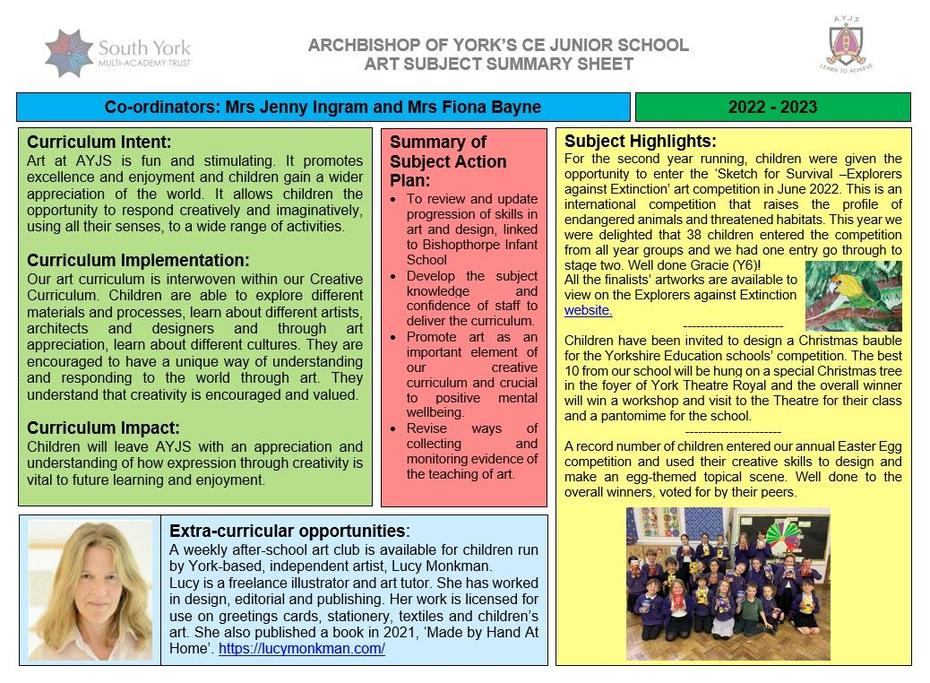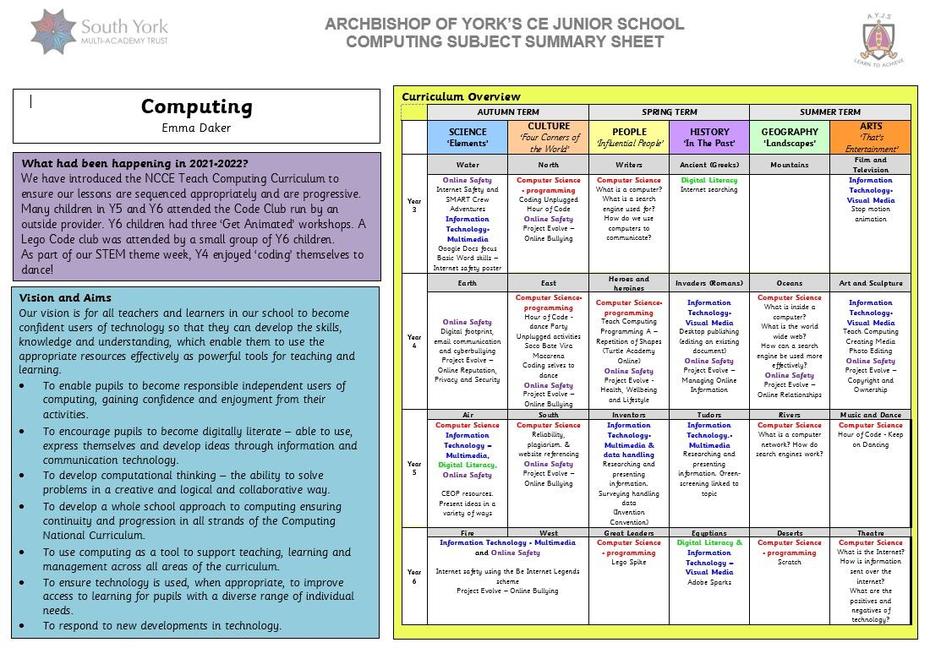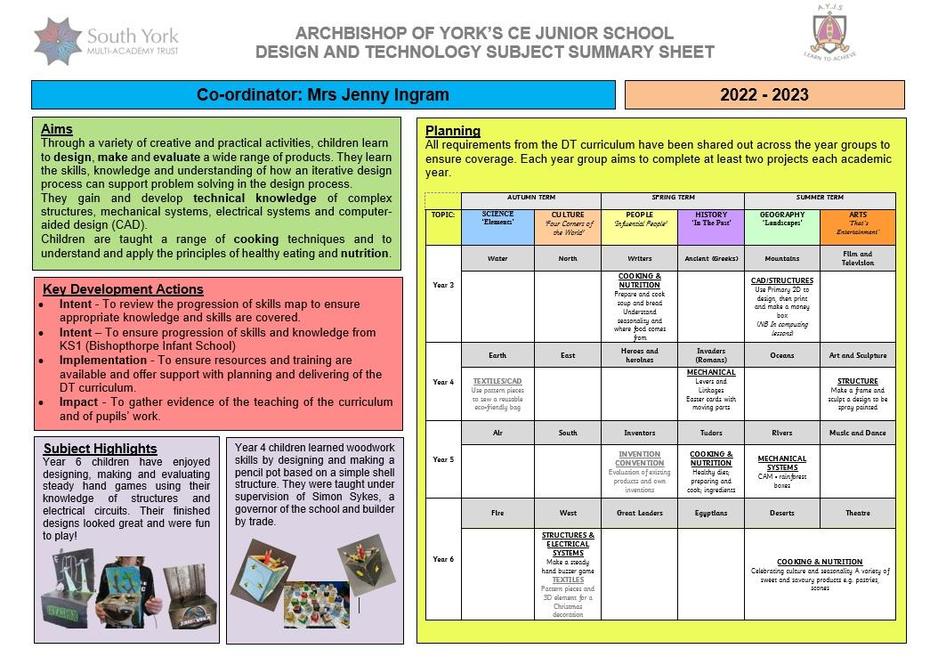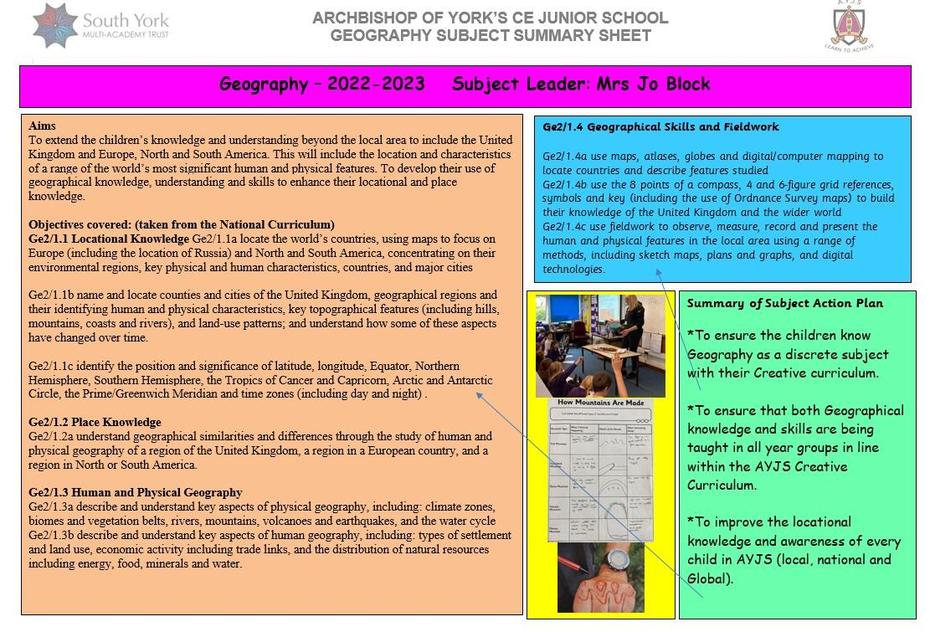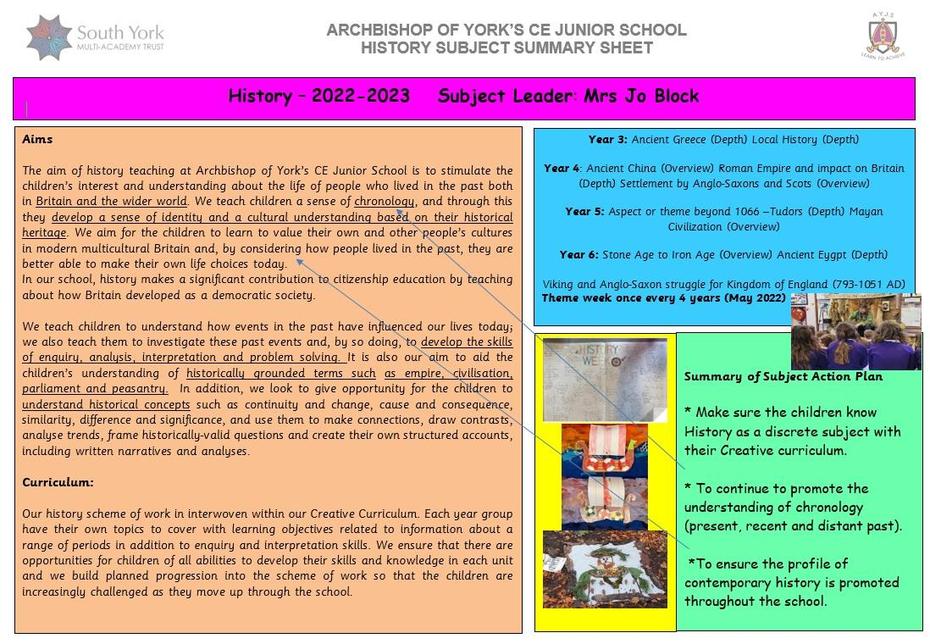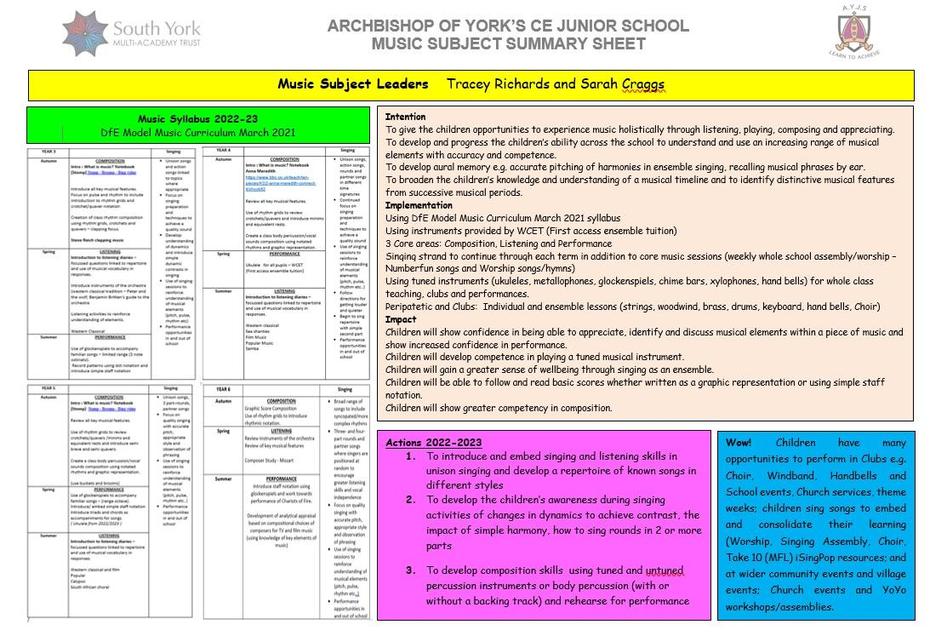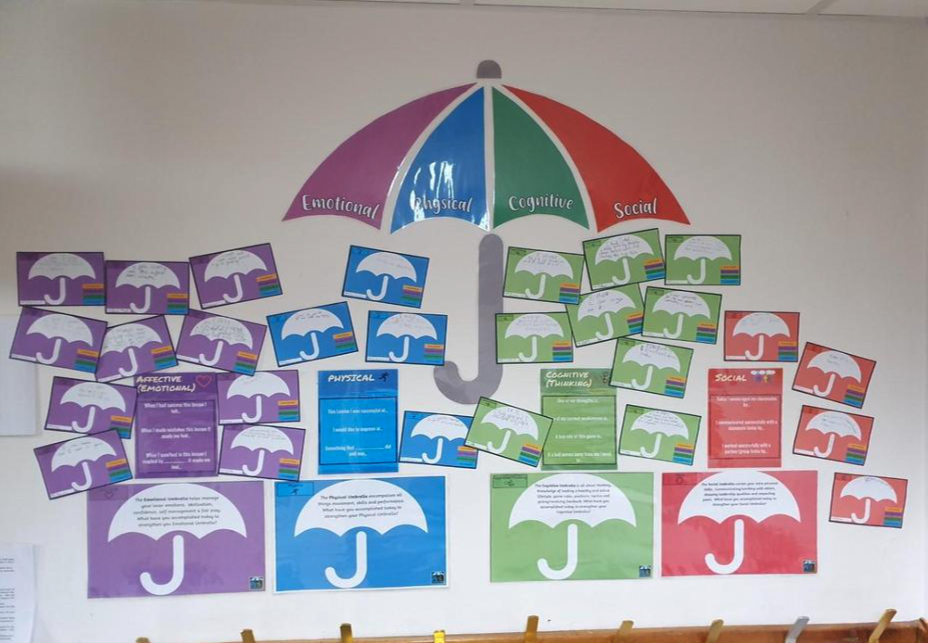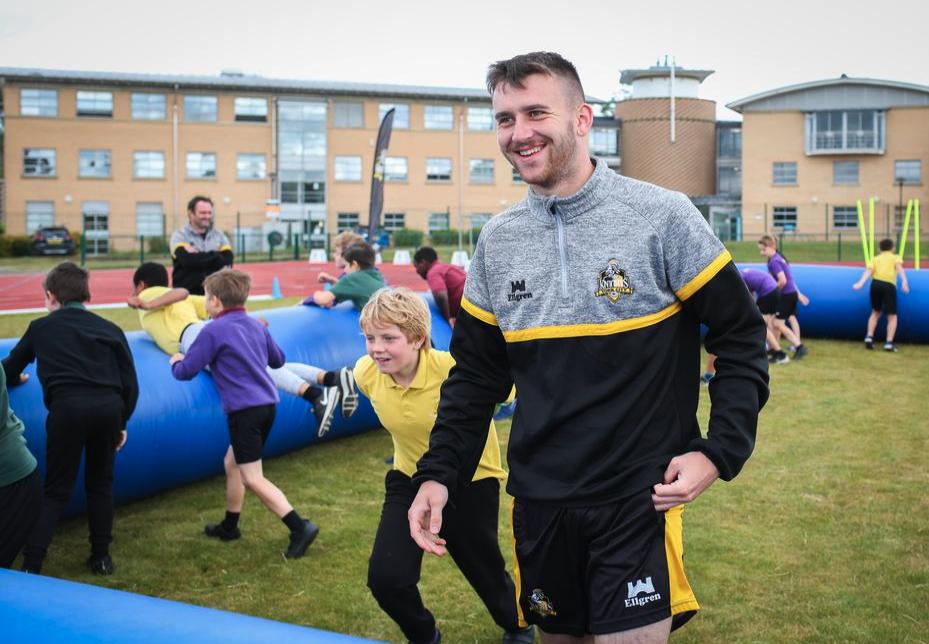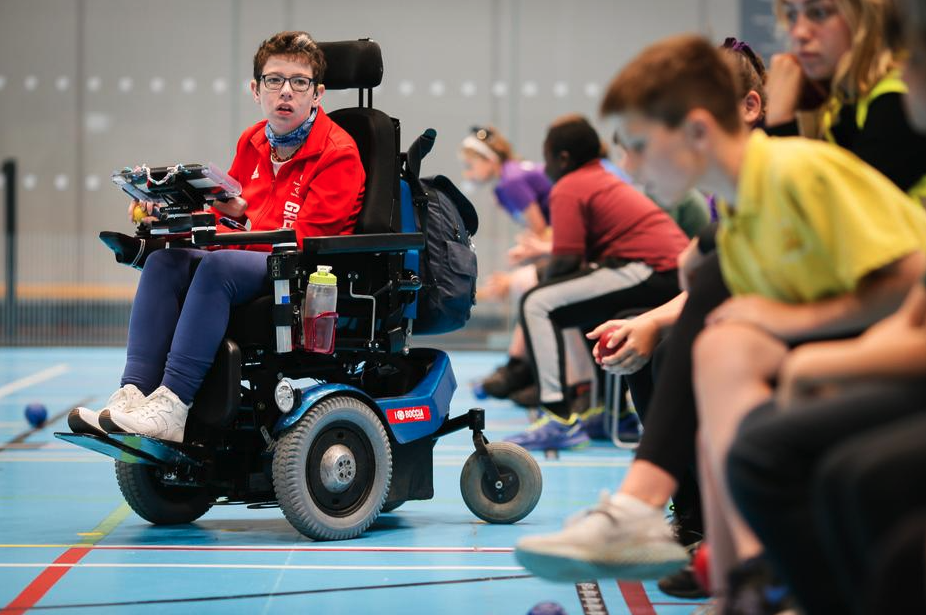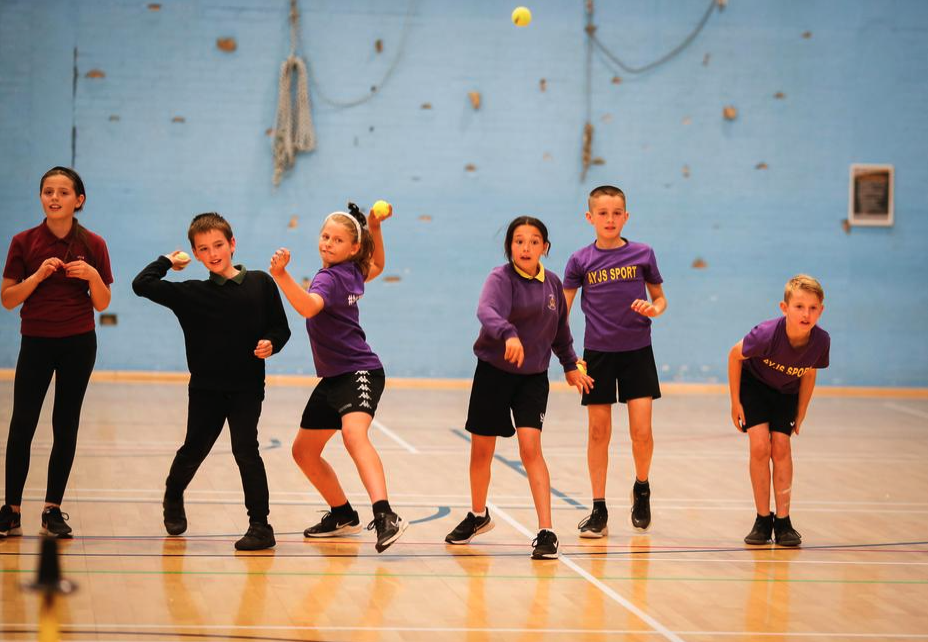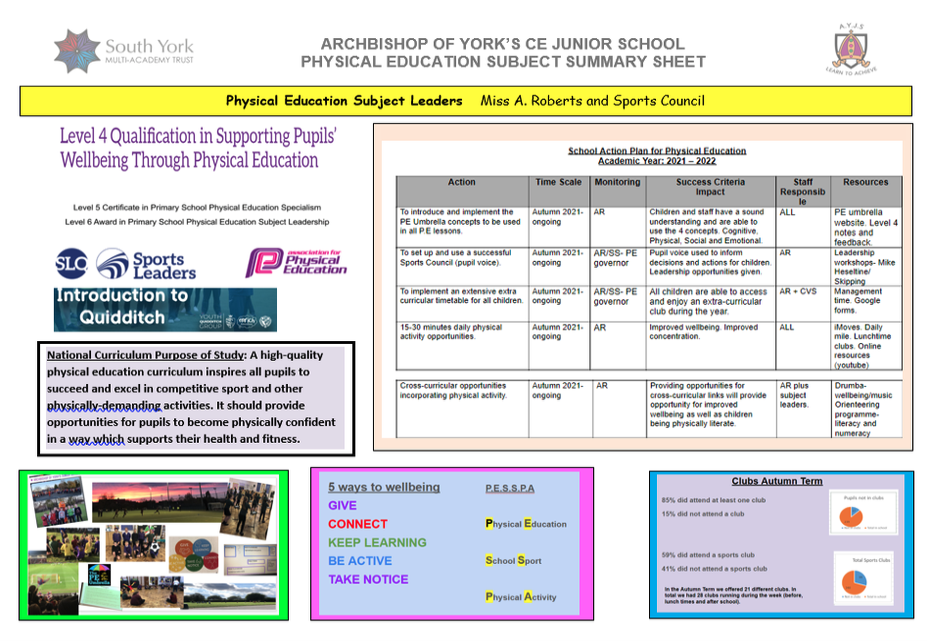Curriculum
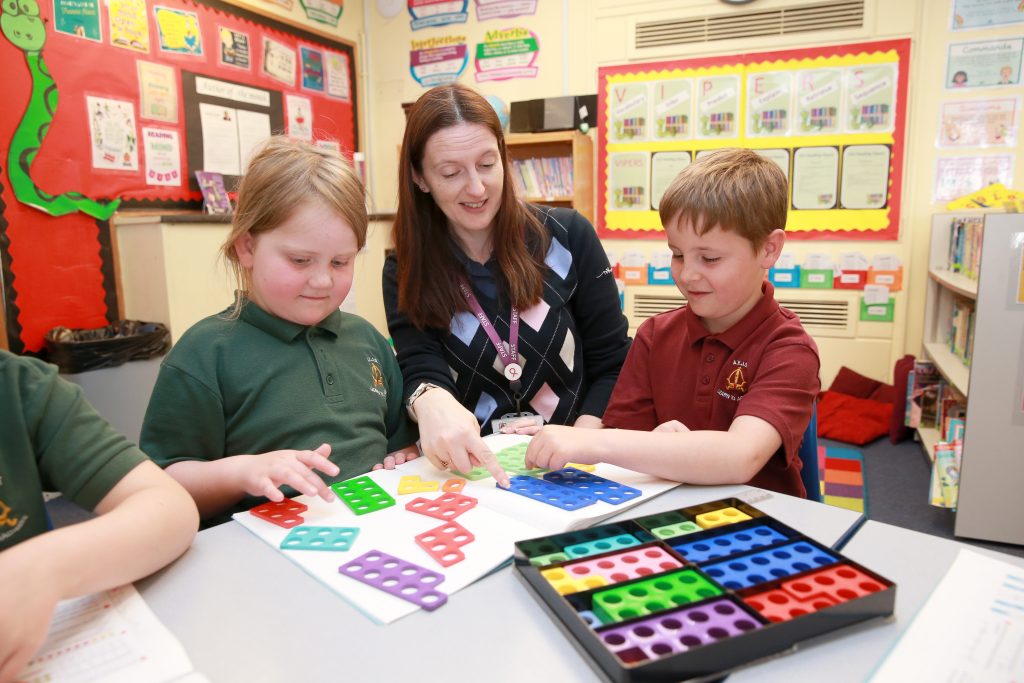
Curriculum Statement of Intent
Through an engaging and immersive creative curriculum, pupils are equipped with the knowledge and skills to be lifelong learners. Topic based teaching provides meaningful and relevant experience; encouraging challenge that motivates learning, whilst continuing to respond to our children’s changing interests and the developing world around them. Embracing creative arts and sporting opportunities, our distinct curriculum supports our core values, whilst nurturing development and creating an environment in which every child can achieve.
Core Curriculum by Subject
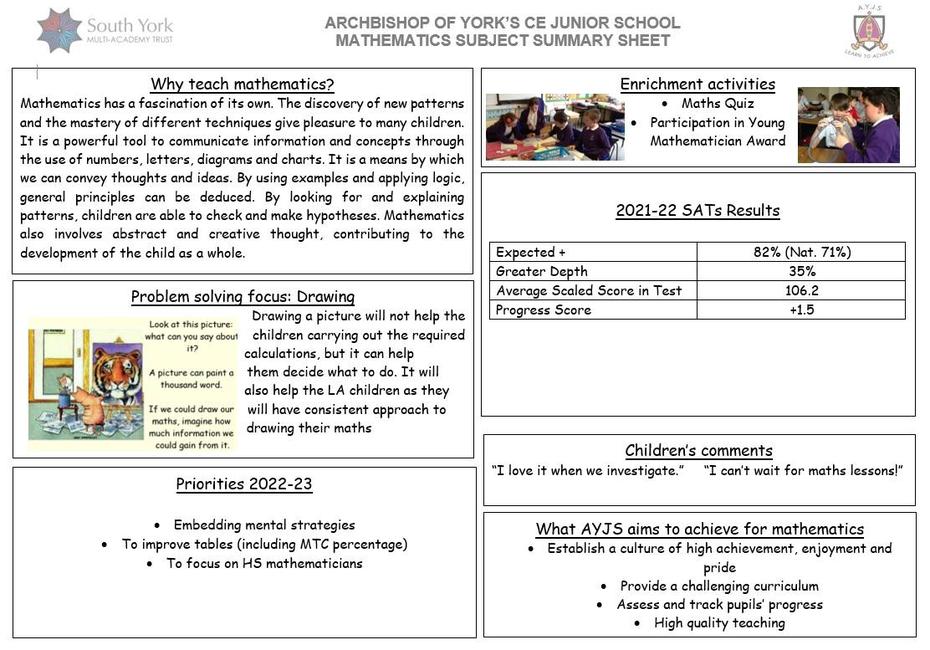
Mathematics Curriculum by Year Group
Mathematics Programme of Study
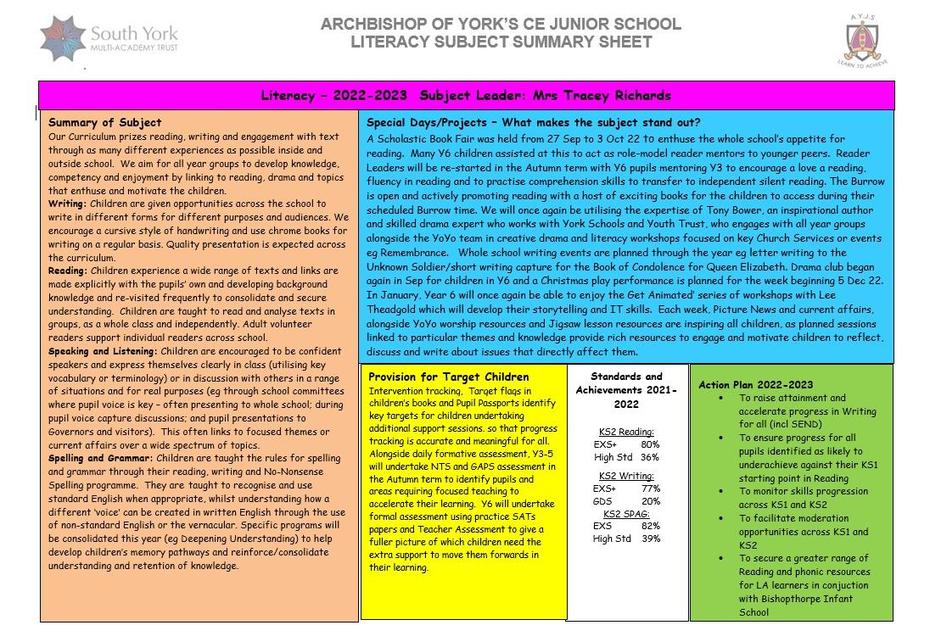
Literacy Overview by Year Group
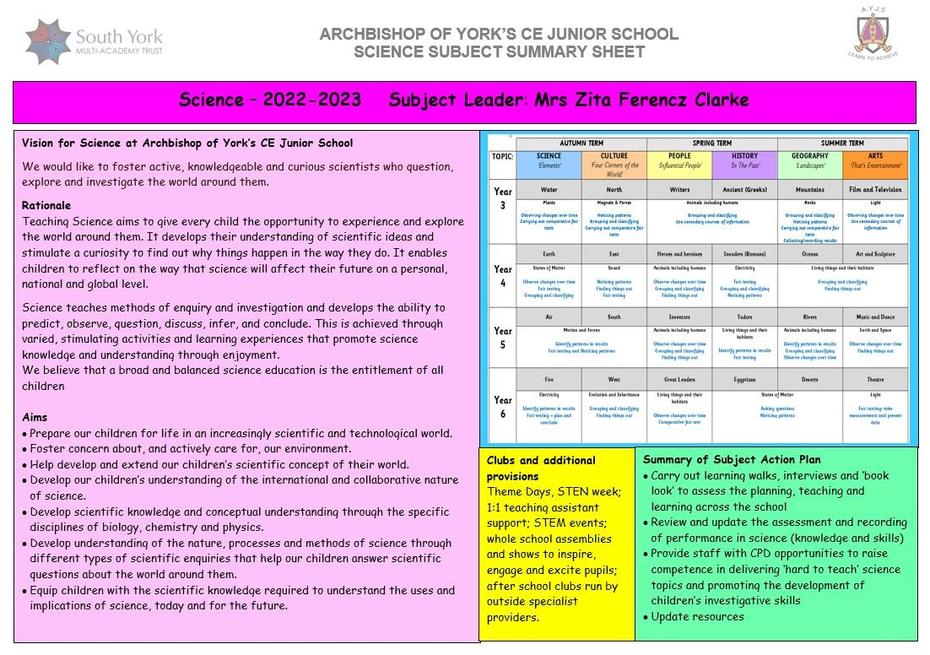
Science Curriculum Long Term Overview
Progression in Science
AYJS Working Scientifically Progression Map
Science Links
Space related educational resources for home schooling
TopMarks – Science games and movies
Crickweb – Science games and interactive resources
Science for Kids – Fun science and technology for kids



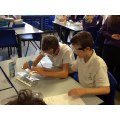
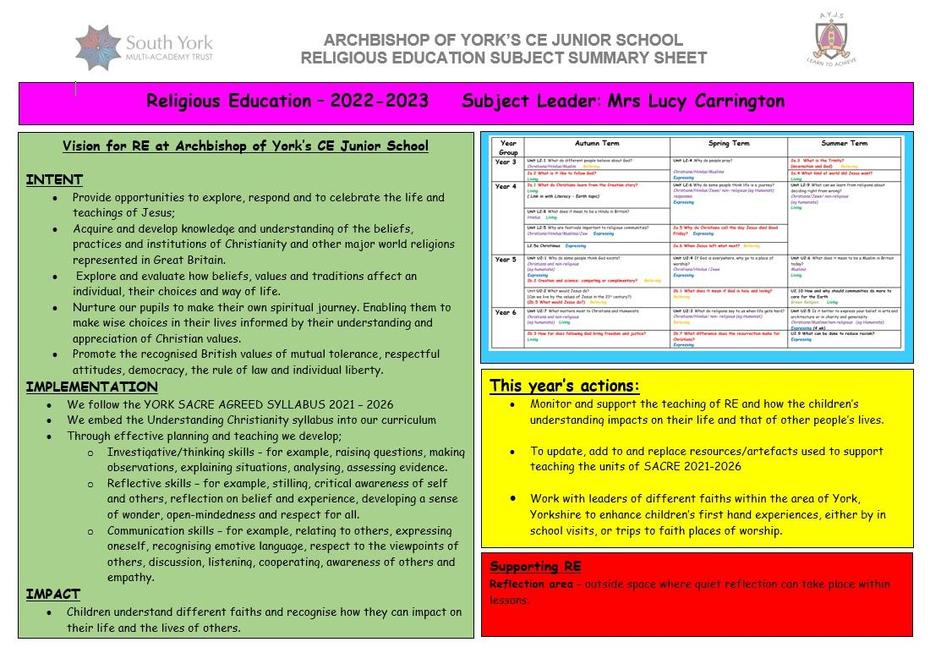
Religion Education Curriculum Overview
Progression in Religion Education
Foundation Curriculum by Subject
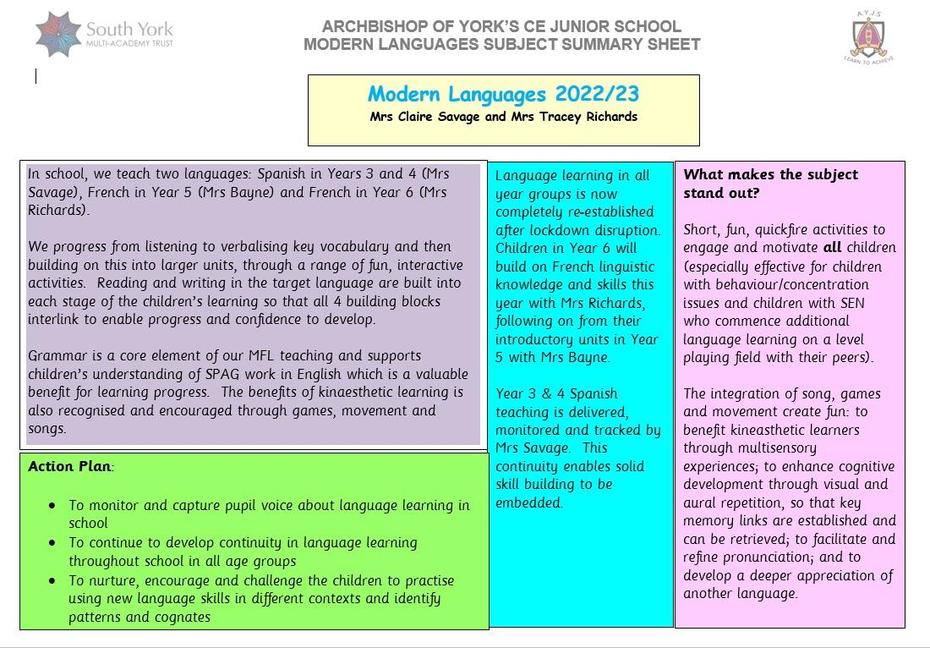
Progression in Modern Foreign Languages
P.S.H.E. (Personal, Social and Health Education)
We deliver our PSHE curriculum through the ‘Jigsaw’ scheme of work. It is a universal curriculum that brings together Personal, Social, Health Education, emotional literacy, social skills and spiritual development in a comprehensive scheme of learning.
Jigsaw is designed as a whole school approach, with all year groups working on the same theme (puzzle) at the same time.
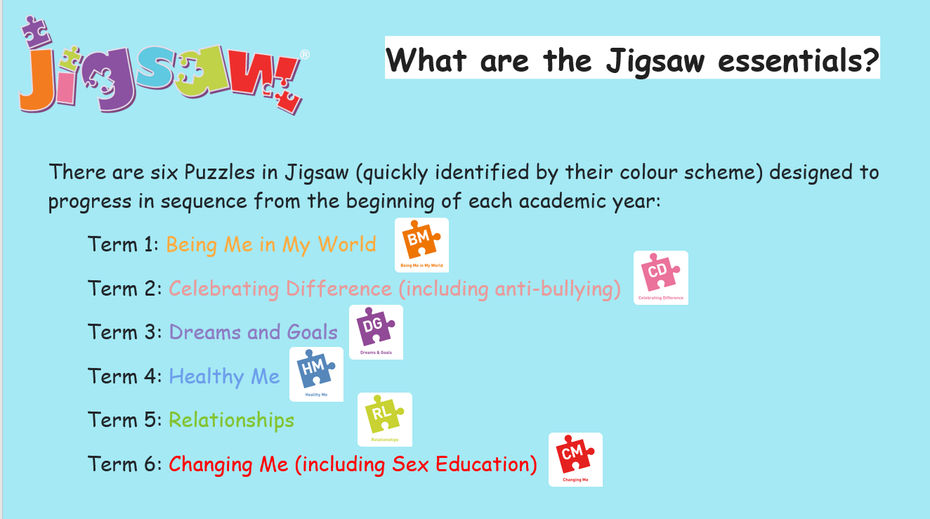
Progress in PSHE
Term Dates
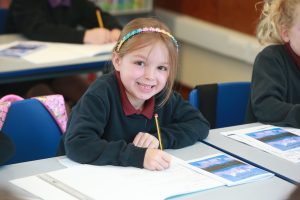
Calendar Dates for Parents
Term Dates 2023/2024
| School Breaks Up | School Re-opens | |
| Academic Year 2023/2024 | Wednesday 6 September 2023 | |
| Autumn Half Term | Friday 27 October 2023 | Monday 6th November 2023 |
| Christmas | Thursday 21 December 2023 | |
| Spring Term starts | Monday 8th January 2024 | |
| Spring Half Term | Friday 9 February 2024 | Monday 19 February 2024 |
| Easter | Friday 22 March 2024 | |
| Summer Term starts | Monday 8 April 2024 | |
| May Bank Holiday | Friday 3rd May 2024 | Tuesday 7 May 2024 |
| Half Term | Thursday 23 May 2024 | Monday 3 June 2024 |
| Summer Holiday | Friday 19 July 2024 |
Training Days:
Academic Year 2023/2024
Monday 4 September 2023
Tuesday 5 September 2023
Friday 22 December 2023
Friday 24 May 2024
Monday 22 July 2024
Term Dates 2024/2025
| School Breaks Up | School Re-Opens | |
| Academic Year 2024/2025 | Wednesday 4th September | |
| Autumn Half Term | Friday 25th October | Monday 4th November |
| Christmas | Friday 20th December | |
| Spring Term Starts | Monday 6th January | |
| Spring Half Term | Thursday 13th February | Monday 24th February |
| Easter Holidays | Friday 4th April | |
| Summer Term Starts | Tuesday 22nd April | |
| May Day Bank Holiday | Friday 3rd May | Tuesday 6th May |
| Half Term | Friday 23rd May | Monday 2nd June |
| Summer Holiday | Friday 18th July |
Training Days
Academic Year 2024/25
Monday 2nd September 2024
Tuesday 3rd September 2024
Friday 14th February 2025
Monday 21st July 2025
Tuesday 22nd July 2025
Admissions
All children can start school in the September before their 5th birthday. You should apply for your child to start primary or infant school by the 15th of January in the school year your child turns 4. For entry in the September 2025 school year, children will have been born between 1st September 2020 and 31st August 2021. Later start dates are possible and can be discussed with the headteacher.
Applications for children who were born between 1st September 2021 and 31st August 2022 can be made only from the Autumn of 2025.
Following the conversion to academy status the South York Multi Academy Trust is our admissions authority. Applications are processed by, and must be made via, the Local Authority. You will find the South York Multi Academy Trust Admissions Policy on the SYMAT website (under policies).
For any queries about the admissions policy or process you can email [email protected] or call 01904 551554. Further details are available on their website, and details of the admissions policies for all York schools can be found here.
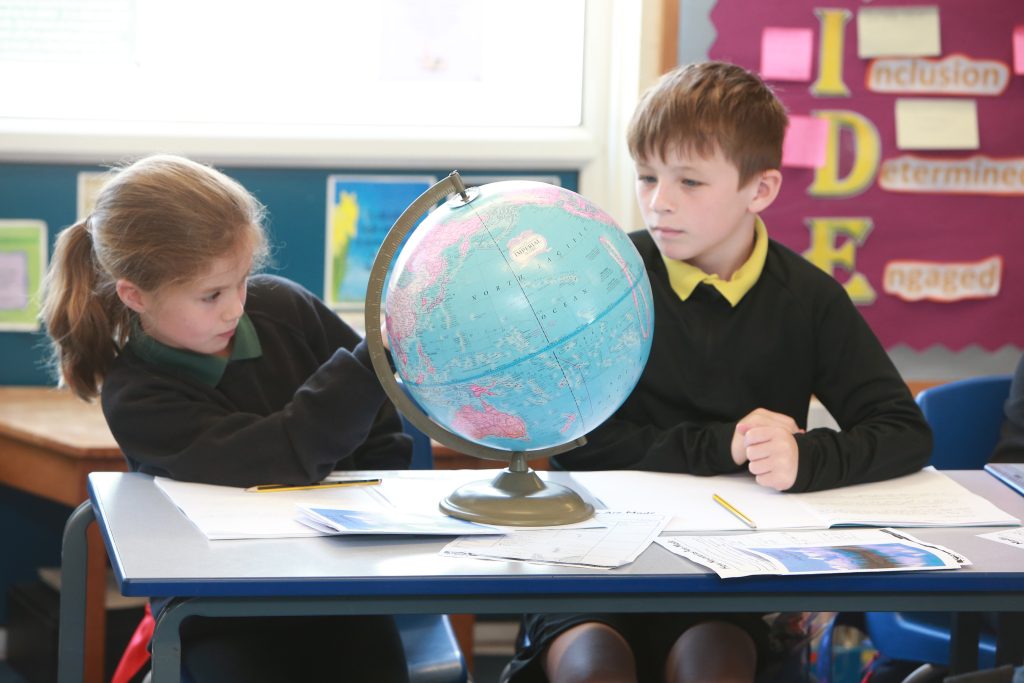
Will your child start reception in September 2025?
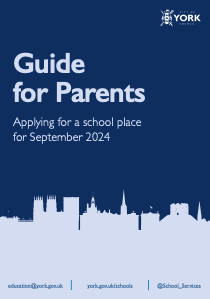 Applications for a place in Reception starting in September 2025 open on 12th September 2024. The deadline for applications is 15th January 2025 although late applications can be made after this date. National Offer Day is the 16th April 2025, or the next working day.
Applications for a place in Reception starting in September 2025 open on 12th September 2024. The deadline for applications is 15th January 2025 although late applications can be made after this date. National Offer Day is the 16th April 2025, or the next working day.
Applications for entry into reception can be made by using the parent portal to apply for a school place.
If you can’t apply online you can request a paper Primary Application Form by calling 01904 551 554. Forms are also distributed to primary schools and nurseries in the York area.
Please read the guide for parents applying for a school place, as it contains key information on school admissions. You can also find the Guide to School Catchment Areas online. We also advise you to keep checking on the City of York Council Admissions site to keep updated with key dates throughout the year.
Key Dates for the City of York Council Admissions Process for Reception 2025
- 12th September 2024 – opening date for applications
- 15th Jan 2025 – Deadline for applications
- 16th April 2025 or the next working day – National Offer Day
- 17th May 2025 – Appeal forms to be returned
- June-July 2025 – Admission appeals heard
- September 2025 – Applications for the 2026 entry into Reception expected to open
Admission Consultations
South York Multi Academy Trust is our admissions authority. Admissions consultation for entry in 2025-2026 which will be held by all admissions authorities in the City of York.
PAN
The Published Admission Number (PAN) is the number of pupils it is intended to admit into the first year group of school (Y3). The number for Archbishop of York’s CE Junior School for 2023 -2024 is 60 places.
You can find more documents on the Local Authority website.
Ofsted/SIAMS
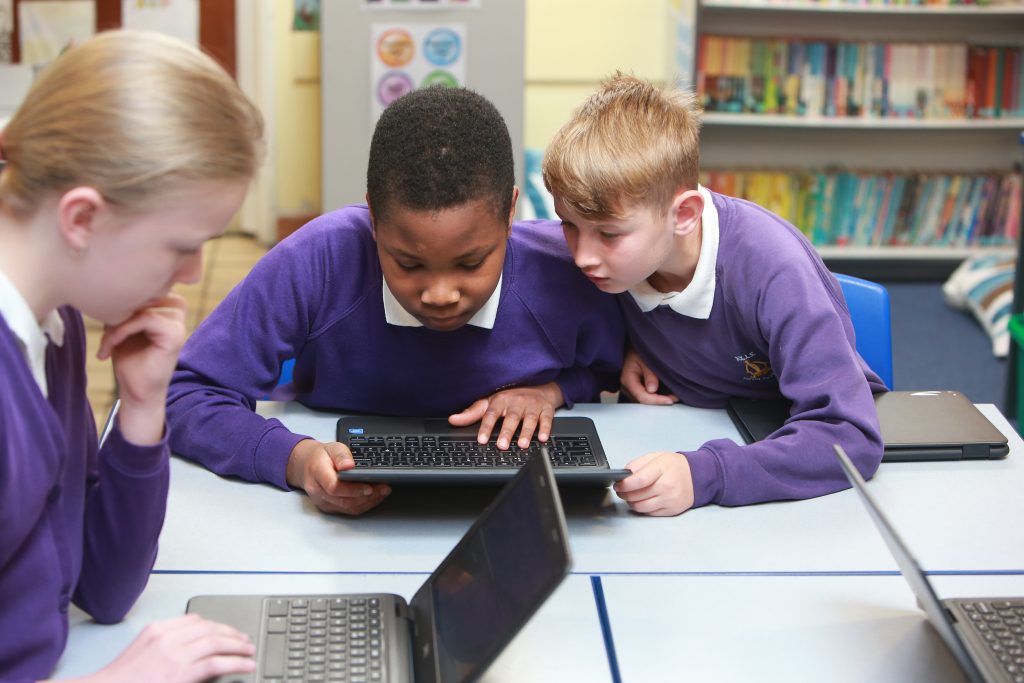
We are very proud of being a ‘Good‘ school in all areas. Our last inspection was done in October 25th and 26th 2023.
SIAMS Reports
All Church of England dioceses and the Methodist Church use the Church of England Education Office’s framework for the Statutory Inspection of Anglican and Methodist Schools (SIAMS) under Section 48 of the Education Act 2005. The SIAMS Evaluation Schedule sets out the expectations for the conduct of the Statutory Inspection of Anglican, Methodist and ecumenical Schools under Section 48 of the Education Act 2005.
AYJS was awarded the J1 Judgement which means that the inspection findings indicate that the school is living up to its foundation as a Church school.
KS2 Results
Performance Tables
To view the Performance Tables for primary, secondary and special needs schools and colleges and check their performance please visit School Performance Tables. To view our Performance Table visit AYJS Performance Table.
National Curriculum tests (SATs)
At the end of KS2, the children in Year 6 will all receive a scaled score. It will be reported as the formal outcome of tests in Maths, Reading and Grammar, Spelling and Punctuation. This is in the form of a percentile rank so parents and teachers know exactly where they stand against their peers. The scores that children can record will range from 80 to 120. One hundred (100) is the middle point and is considered to be the National ‘Expected Standard’. Therefore, any child achieving 100 or more is working at or above the national expected standard. Children recording scaled scores between 110 and 120 will be classed as performing at a High Standard.
Writing at the end of KS2 is Teacher Assessed. Children will be recorded at one of three stages
- Working towards the Expected Standard
- Working at the Expected Standard
- Working at Greater Depth
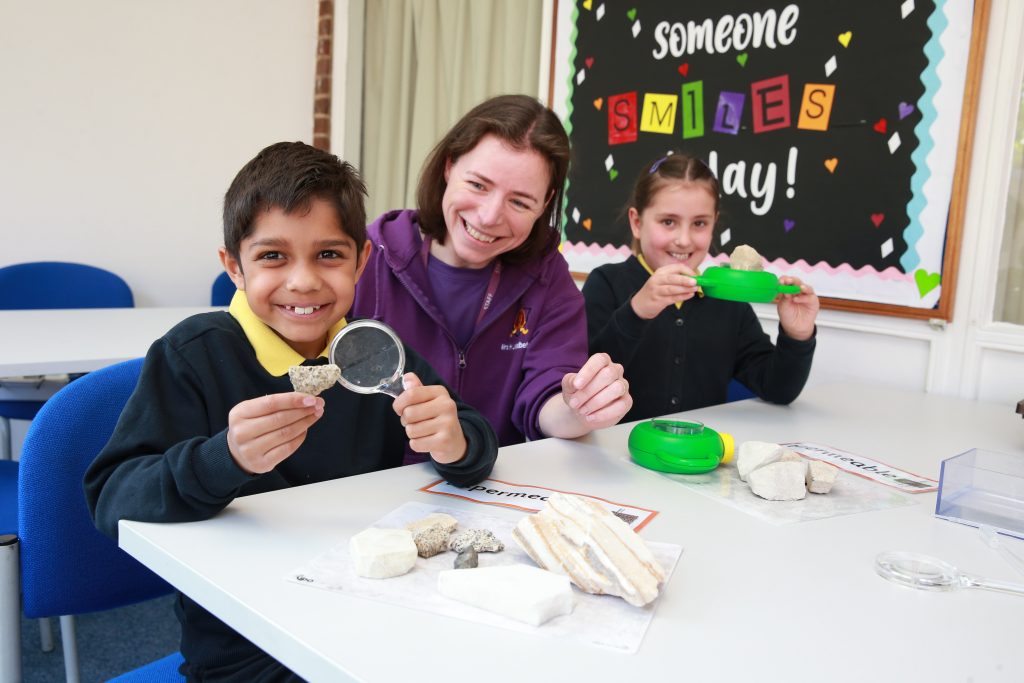
- AYJS KS2 Results – 2024
- AYJS KS2 Results – 2023
- AYJS KS2 Results – 2022
- AYJS KS2 Results – 2019 (* these performance measures are not current)
* Schools are not required to publish their exam and assessment results from the 2019-2020 academic year as these have not been published as performance measures by the Secretary of State. Please see 2019 performance measures but note that these performance measures are not current.
Pupil Premium
Pupil Premium Spend – Information for Parents
- registered as eligible for free school meals at any point in the last 6 years
- been in care for 6 months or longer
- £1,455 for each eligible primary-aged pupil
Schools will also receive £2530 for each pupil who are:
- adopted from care or have left care
- looked after by the local authority
Schools will also receive £335 for children from service families.
- performance tables, which show the learning and progress of disadvantaged pupils as shown by outcomes data
- requiring schools to publish a statement online each year with the level of pupil premium funding received by the school, how they use it and the impact it has on the attainment of disadvantaged pupils.
- the Ofsted inspection framework, where inspectors focus on the attainment of pupil groups, and in particular those who attract the pupil premium
Key principles how the pupil premium is spent at AYJS:
- AYJS aims to raise achievement for pupils who are eligible for Pupil Premium to at least the level of their peers. The school is aware that this means that some of these pupils must make faster progress than non-eligible pupils and is determined to achieve this.
- AYJS never confuses eligible pupils with low ability and strives to ‘bring out the best’ in this group of pupils and support them to achieve the highest levels.
- AYJS creates an overall package of support aimed to tackle the range of barriers including: attendance, behaviour, external factors, professional development focusing on improving outcomes for eligible pupils, improving the quality of teaching and learning, language acquisition, parental engagement, opportunities for first-hand experiences and development of literacy and numeracy skills.
- AYJS uses assessment systems to track and enable thorough analysis of data (Reading, Writing and Maths) to identify pupils who are under achieving and why.
- AYJS directs resources and interventions to accelerate progress of eligible pupils and close the attainment gap compared to their peers.
- AYJS uses data to carefully track the impact of targeted spending (interventions, projects or pedagogy) on attainment and progress of eligible pupils.
- The Headteacher and Pupil Premium Leader have a clear overview of how funding is allocated and the difference it is making to the outcomes of pupils termly.
- AYJS ensures class teachers, phase leaders and subject leaders know which pupils are eligible for Pupil Premium so they can take responsibility for accelerating progress and accountability is shared across the school.
- The Governing Body is ambitious for pupils and closely monitors the school’s effectiveness in closing the gap between different groups of pupils.
- As specified in the school Charging and Remissions policy, we will fund participation in school visits and extra-curricular activities for Pupil Premium pupils when appropriate.
The date of the next pupil premium strategy review is 31st December 2023.
Sports Premium
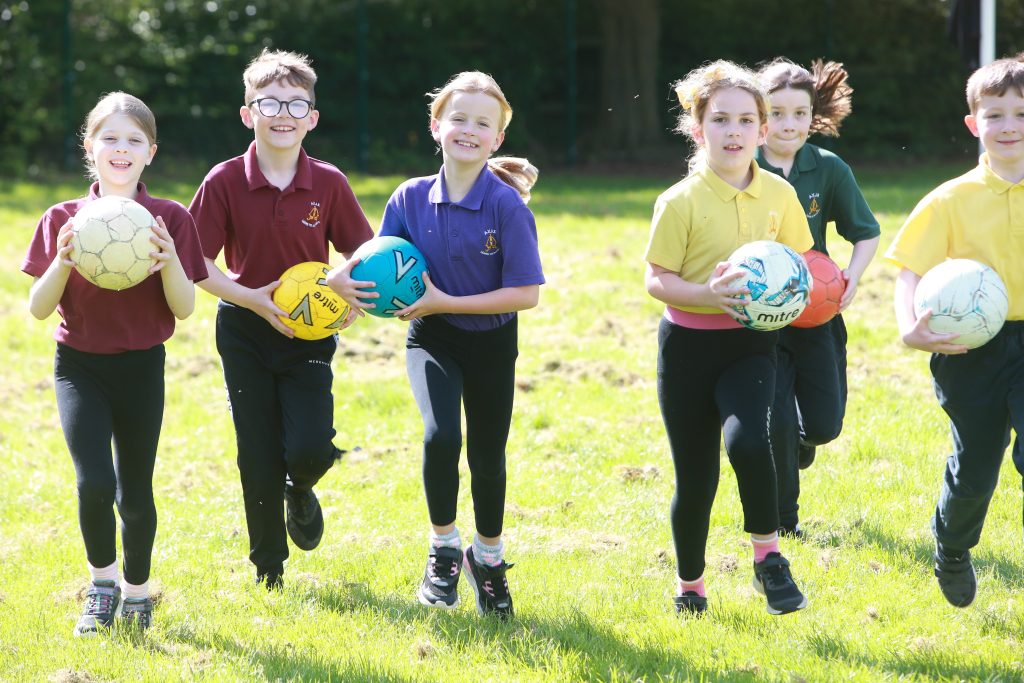
Sports Premium Funding
The government has provided funding of £320 million per annum to provide new and substantial primary school sport funding. The funding is being jointly provided by the Departments for Education, Health and Culture, Media and Sport, and will see money going directly to primary school Head teachers to spend on improving the quality of sport and PE for all their children. Each school receives £16,000 plus an extra £10 per pupil each year. We received £18,490. Money can only be spent on sport and PE provision in schools. The money will be used so that all children benefit regardless of their sporting ability.
Purpose of the funding
All schools have to spend the sport funding on improving their provision of PE and sport, but there is freedom to choose how we do it. At AYJS we recognise the contribution of PE to the health and well-being of the children. In addition, we believe that an innovative and varied PE curriculum and extra-curricular opportunities have a positive influence on the concentration, attitude and academic achievement of all children. Therefore we have prioritised our spending into two main areas:
- Continue all teaching staffs development across PE.
- Renew necessary resources for curriculum and extra-curriculum use.
- Enhance the variety of sporting opportunity for all children
Sustainability of School Sport at AYJS
We believe that it is essential to deliver to the children of AYJS, a wide variety of opportunities inside and outside the curriculum. These are provided by our enthusiastic and expert staff and also the numerous and various expert outside providers, with whom we have excellent links.
We recognise that these groups of people give our children and staff additional knowledge and expertise in sports and games which the school in isolation could not provide. They also deliver to the staff additional CPD and therefore the tools and skills to provide the teaching of these areas in the future. The crucial thing is that our children benefit, find it memorable and continue to be active and enthusiastic participants in Sport for their lifetime.
With all this in mind, we reach out into our community and receive support from various people and groups.
Policies
For our current policies, please select the appropriate link below. If you would like paper copies of any of these documents, please contact the school office, who would be happy to assist you. These will be provided free of charge to parents.
- Admission arrangements to Archbishop of York’s C.E Junior School
- SYMAT Admission Policy for Reception place September 2024 (external link to policy published on the SYMAT website, under ‘Admissions’)
- Apply for a school place use link https://www.york.gov.uk/SchoolAdmissions
Attendance
Behaviour
Charging and Remissions Policy
- Find within the SYMAT Financial Handbook (external link to policy published on the SYMAT website, under ‘Policies’)
- Coming soon
- Religious Education Policy (June 2024)
Personal, Social, Health and Economic (PSHE)
Educational Visits
- SYMAT Adopted NYCC Educational visits, Outdoor Learning and Adventurous Policy please view under ‘More Policies’
E-Safety and Online Safety
- SYMAT Equalities and Diversity Policy – please view under ‘More Policies’
Health & Safety
- Health and Safety Policy – please view under ‘more policies’
- Archbishop of York’s C.E Junior School H & S Statement – coming soon
- Fire Safety and Evacuation Procedures – coming soon
- Lettings Policy – please view on Appendix 8 of Financial Handbook
- Lettings Form – coming soon
Medical
- Supporting Pupils with Medical Conditions – please view under ‘more policies’
- SYMAT Children with Health Needs who Cannot Attend School – please view under ‘more policies’
- First Aid Policy – please view under ‘more policies’
- Medical Form – coming soon
Safeguarding
- Safeguarding Statement (Sept 24) (external SYMAT website, found on the Policies tab)
- Child Protection and Safeguarding (external SYMAT website, found on the Policies tab)
- ‘Keeping Children Safe in Education’ (external link to gov.uk website)
- City of York Safeguarding Partnership (external link to Safer Children York website)
School Uniform
- York Local Offer for SEND (external link)
- Allergens Policy
- Anti Bullying Policy
- Behaviour Policy
- Charging and Remissions Policy
- Child Protection and Safeguarding Policy 2022-23 (SYMAT)
- Collective Worship Policy
- Complaints Policy
- Equality and Diversity Policy
- First Aid Policy (SYMAT)
- Health & Safety Policy (SYMAT)
- Home School Partnership Agreement 2022-2023
- Infection Control Policy
- Lettings Policy
- Local Health and Safety Policy
- Online Safety Policy
- Privacy Notice – Employment
- Privacy Notice – Pupils and Parents
- Privacy Notice – Website Use and Privacy Notice
- Privacy-Notice – Admissions
- Privacy-Notice – Volunteers
- Promoting British Values Policy
- Publication Scheme
- Religious Education Policy
- Safeguarding Statement 2022-23 (SYMAT)
- School Uniform Policy
- Spiritual Moral & Cultural Development Policy
- Supporting Pupils with Medical Conditions
SEND
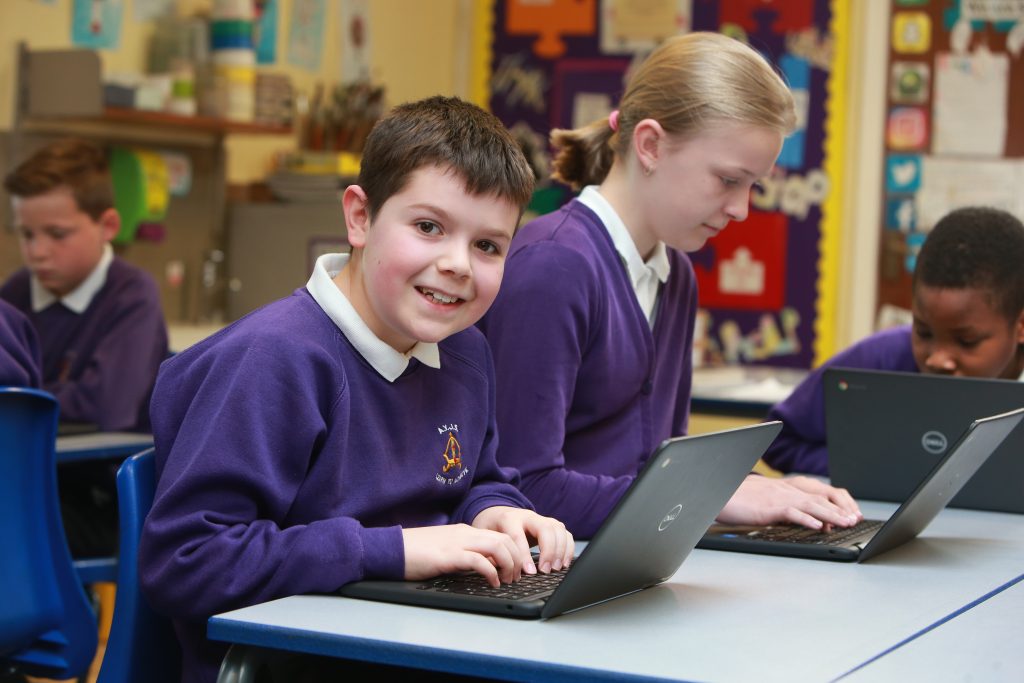
Archbishop of York’s CE Junior School welcomes all children and values them as individuals, treating them equally and with respect. We believe that all children have the right to have their own particular needs recognised and addressed in order to achieve success.
We take our duty to provide equal opportunities for every person in our care very seriously.Through an open culture of respect and self-belief, we aim to deliver the highest possible quality of education for all pupils based on a foundation of Christian values and practice. We are committed to ensuring that all children, including those identified as having a special educational need or disability, have a common entitlement to an accessible, broad and balanced academic and social curriculum and are fully included in all aspects of school life. We value each child and encourage them to achieve the best possible outcomes enabling them to be confident and successful as they continue their lifelong learning.
We endeavour to raise the aspirations and expectations of all pupils, including those with SEND, by working collaboratively with parents and carers and listening to the voice of the pupil.
Key contact for school: Zita Ferencz Clarke (SENDCo) who can be contacted via the school office.
SEN Complaints Procedure
For complaints by a parent of children with SEN needs please read through our ‘Complaints Policy’ document which can be found on our Policy Page above
Safeguarding
Safeguarding Policy
Please read through our latest Child Protection and Safeguarding (external SYMAT website, found on the Policies tab)
Statement of Intent
The South York Multi Academy Trust (SYMAT) are committed to safeguarding and promoting the welfare of children and young people within its family of schools. It expects all staff and volunteers to share this commitment.
We provide an inclusive, positive and caring environment in which our children and young people can develop their academic, social and emotional potential.
Every adult is expected to play their part in safeguarding our children and young people. Each school supports this through their offer of safeguarding and child protection awareness training. All staff in all our schools know the procedures that should be followed should they have any concerns about a student. All staff know where to go should they require some information, help and guidance.
The Trust supports each school in the following ways:
The Trust fully adopts the Keeping Children Safe in Education September 2024 Guidance
As a Trust we undertake safeguarding reviews and audits on an annual basis by an independent body that scrutinises our policy and procedures.
The Trust is led by a Chief Executive who has ultimate responsibility for excellence in safeguarding
Each school has its own Safeguarding Policy that details their school specific advice and designated safeguarding officer details
Each school has a governor on its Governing Body with special responsibility for safeguarding.
Reporting Concerns
If you are concerned about the welfare of a pupil at any of our schools contact the relevant Designated Safeguarding Officer in each school. Details can be found in the Trust Policy and on each school website.
Trustees are responsible for safeguarding, even if certain aspects of the work are delegated to staff. Trustees must make a clear commitment to safeguarding and publish the safeguarding statement stating that failure to follow the statement will be dealt with as a very serious matter.
Key contacts for the School:
| 1. Safeguarding Lead (Executive Headteacher) | Kerry Davies |
| 2. Deputy Designated Safeguarding Lead | Claire Savage |
| 3. Nominated Governor for Safeguarding | Tim Andrew |
Attendance
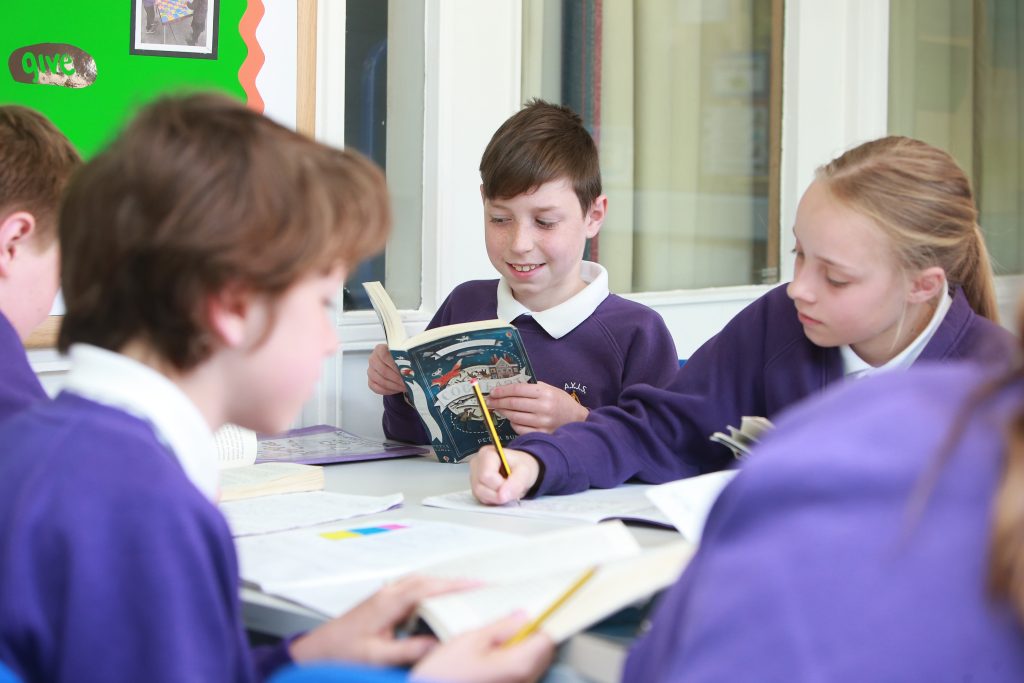
- AYJS Attendance Policy Nov 2022
- Attendance Policy Appendix 1
- Attendance Policy Appendix 2i Unauthorised Holiday Less than 10 sessions
- Attendance Policy Appendix 2ii – Unauthorised Holiday 10 sessions or more
- Attendance Policy – Appendix 3 Sample Attendance Report
- City of York – Fast Track Process and Leave of Absence
- School Attendance CYC
- AYJS Attendance 13.10.22
Computing
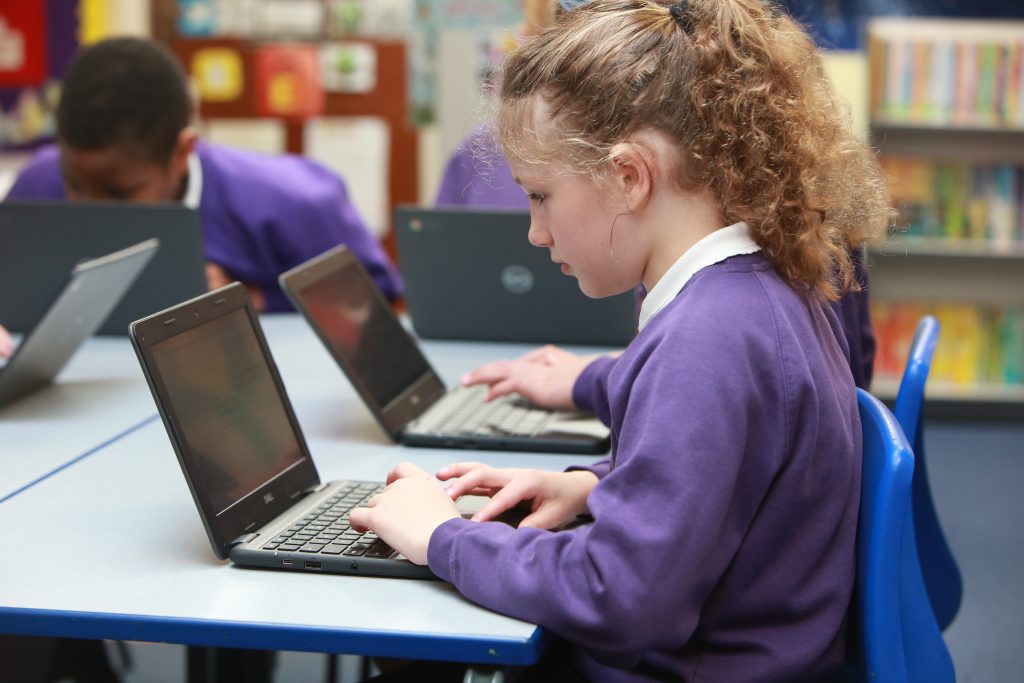
Online Safety
Please have a look at our comprehensive Internet Safety page.
Policies
Please take time to read through our Internet and ICT Acceptable Use Policy (Pupils), Online Safety (formerly E-Safety) and Privacy policies on our Policies page.
GDPR: In May 2018, the General Data Protection Regulation (GDPR) came into action. As a school, we take the data of your children very seriously. We ensure that any online educational resources we use are all GDPR compliant. For further information please see our Policies page.
Internet Access and G Suite for Educational Access for Pupils
As part of the school’s curriculum, we offer pupils supervised access to the Internet which we believe is an integral part of our learning environment.
Computing aims to prepare pupils to participate effectively in a rapidly changing world in which work and other activities are increasingly transformed by access to developing technology including the Internet. With this in mind, we use the services of Vital York Limited to ensure we have a secure learning intranet for our pupils and staff. Vital York Limited provide children with Google accounts which have a high level of security and are closely monitored.
Pupils use their accounts to access G Suite for Education. This is a set of productivity tools from Google including Gmail, Calendar, Docs, Slides and Classroom. Pupils will use their G Suite accounts to complete assignments, communicate with their teachers, sign into their Chromebooks and learn 21st century digital citizenship skills. The pupils’ Gmail communication is for internal use only and cannot be shared with external email accounts.
Assignments are set by teachers using Google Classroom and all pupils’ work is stored with Google Cloud. Pupils can log in to their Google accounts at home using the same login as at school. Both G Suite for Education and Gmail are encrypted and have strict privacy policies. Please see their GDPR statement for further information.
We have been using G Suite for Education for a few years now and truly believe that the benefits to pupils from access to the Internet and the use of the G Suite tools, in the form of information resources and opportunities for collaboration, exceed any disadvantages. During school time, teachers will guide pupils towards appropriate material. Obviously at home, families bear the same responsibility for guidance as they exercise with other information sources such as television, telephone, films and radio.
Other Online Tools used at AYJS
We will sometimes use or trial different online tools. These tools may require your child to have a login that require us to store pupils’ names, usernames and their work. Below is a list of tools that we currently use in school:
- Code.org – coding. Privacy
- Seesaw is an online platform for student engagement. GDPR
- Times Table Rockstars – Games aimed at boosting times tables knowledge and recall. GDPR
SPAG Monsters – an online learning tool that supports children to develop their spelling, punctuation and grammar skills. GDPR

